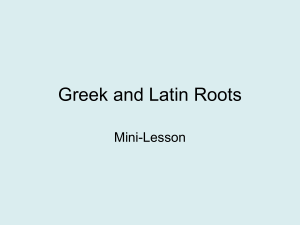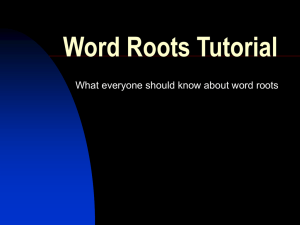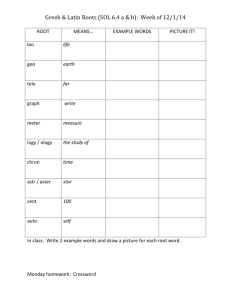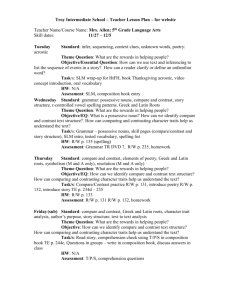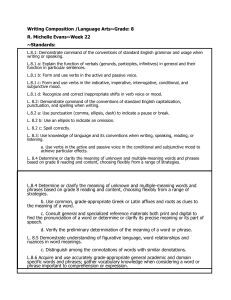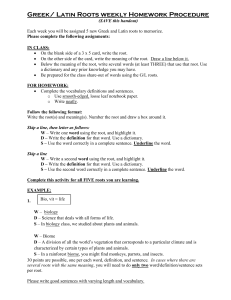Word Work Lists 2015-2016
advertisement
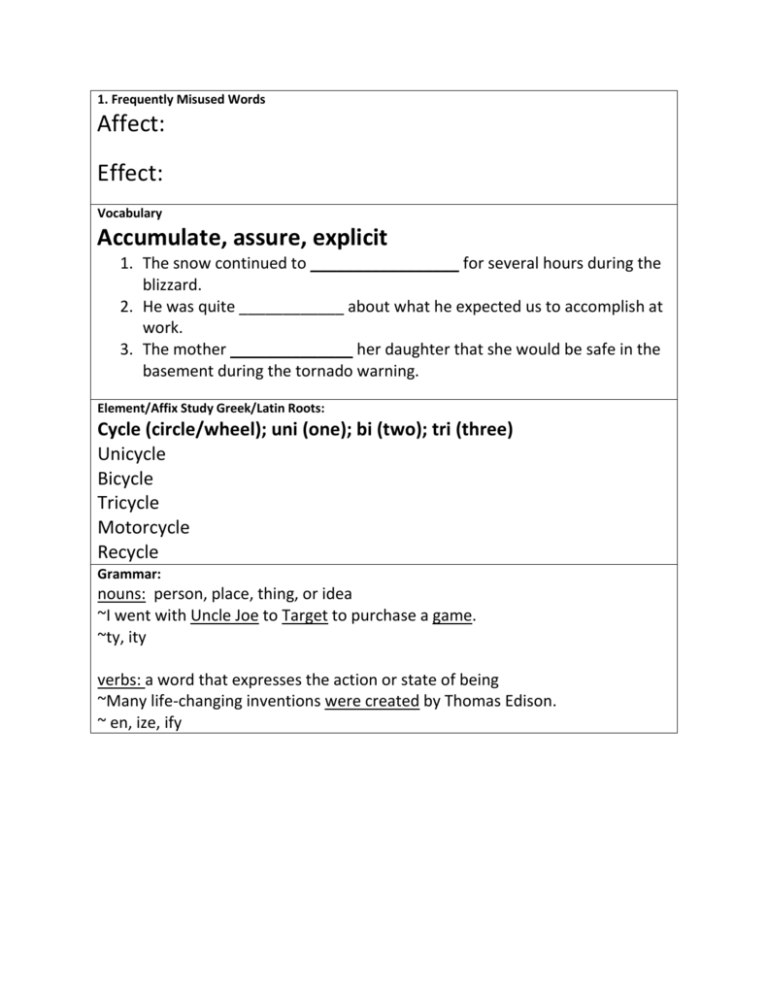
1. Frequently Misused Words Affect: Effect: Vocabulary Accumulate, assure, explicit 1. The snow continued to _________________ for several hours during the blizzard. 2. He was quite ____________ about what he expected us to accomplish at work. 3. The mother ______________ her daughter that she would be safe in the basement during the tornado warning. Element/Affix Study Greek/Latin Roots: Cycle (circle/wheel); uni (one); bi (two); tri (three) Unicycle Bicycle Tricycle Motorcycle Recycle Grammar: nouns: person, place, thing, or idea ~I went with Uncle Joe to Target to purchase a game. ~ty, ity verbs: a word that expresses the action or state of being ~Many life-changing inventions were created by Thomas Edison. ~ en, ize, ify 2. Frequently Misused Words lay: lie: Vocabulary Bias, stereotype, cease 1. The fire alarm sound ______________ once all of the children left the building. 2. To have left the boy out of the game, would have looked as though the coach were _________________. 3. Teaching as a feminine occupation is a _____________________. Element/Affix Study Greek/Latin Roots: y/ly/ily (like, every, in a certain way; adj & adv) wealthy eagerly awkwardly hastily steadily Grammar: adjectives: word that describe a noun or pronoun to strengthen text ~The brilliant butterfly zipped by the decrepit barn. adverbs: describe verbs, adjectives, or other adverbs. Most adverbs tell when, where, how, and to what extent. ~Marcos quickly zipped over the goal line! 3. Frequently Misused Words your: you’re: Vocabulary Convene, account, ironic 1. The meeting will ____________________ in the auditorium. 2. The traveler used a blog to give an __________________ of his vacation. 3. I told her I had to work all weekend, in which she gave an ______________ reply, “how nice.” Element/Affix Study Greek/Latin Roots: Aud (to hear) vis/vid (to see) Audible Audition Envision Advise Livid Grammar: interjections: words and phrases that are used to express a strong emotion and are separated from the rest of the sentence by a comma or exclamation point ~Wow! This new 6th grade team is so cool! conjunctions: words that join two parts of a sentence and help to show the connection between the two parts of the sentence. ~We went home and went straight to bed. ~We went home early, so we missed the end of the movie. 4. Frequently Misused Words whose: who’s: Vocabulary Decipher, digress, dawdle 1. As the fish pulled down on the bait, the fisherman __________________ and missed his only bite. 2. The archeologist tried to __________________ the ancient writing on the tomb. 3. When you give a speech, make sure that you do not ________________ to a different topic. Element/Affix Study Greek/Latin Roots: Gress/mot/mov (to go, to move) Progress Regress Promote Commotion Unmovable Grammar: prepositions: a word that shows the relationship/location between a noun or a pronoun and another word in the sentence ~The cat snoozed under the lawn chair. Prepositional phrase: includes the preposition and its object. ~Jane threw the watch out the window. 5. Frequently Misused Words there: their: they’re: Vocabulary Emphasis, extract 1. In 6th grade much ______________ is given to how important it is to know your times tables. 2. The dentist attempted to ______________ the infected molar from her mouth. Element/Affix Study Greek/Latin Roots: Ance/ence (state of) Acquaintance Irrelevance Resistance Diligence Competence Grammar: verb tense consistency- keep the same tense throughout a clause Incorrect: Mark finished his essay, tidies his room, and went out for supper. Correct: Mark finished his essay, tidied his room, and went out for supper. subject-verb agreement-singular subjects need singular verbs, plural subjects need plural verbs ~My brother is a nutritionist. ~My sisters are mathematicians. 6. Frequently Misused Words Fewer: Less: Vocabulary Fluctuate, conduct, valid 1. In the spring, the weather temperatures are constantly ________________________. 2. The children’s ______________ was outstanding on the field trip. 3. The scientists agreed that the results from the experiment were _____________. Element/Affix Study Greek/Latin Roots: Cred/fac (to believe, to make) Incredulous Credence Discredit Facilitate Manufacture Grammar: pronouns: word that takes the place of a noun ~Mom and I went to the front door to greet them. subjective pronouns: used when the noun is the subject, replaces noun; I, you, he, it ~He stole the expensive jewels. objective pronouns: acts as the object of the sentence, receives the action, me us, you; ~Take a picture of him. 7. Frequently Misused Words who: whom: Vocabulary intrinsic, justify, redundant 1. The student had the _______________ motivation to do his best work; he didn’t need a candy reward. 2. The student tried to _______________ his action to the principal. 3. Please stop me if I become __________________ or bore you with the details of the plan. Element/Affix Study Greek/Latin Roots: Duc/sequ (lead, follow) Introduction Educate Sequel Sequence Consequence Grammar: subjective pronouns: used when the noun is the subject, replaces noun; I, you, he, it ~He stole the expensive jewels. objective pronouns: acts as the object of the sentence, receives the action, me us, you; ~Take a picture of him. 8. Frequently Misused Words lose: loose: Vocabulary Juvenile, keen, relevant 1. She's a very _______________ observer of the political world. 2. His ________________________ tantrums were not appropriate for his age. 3. Make sure that your details are _________________ to the main idea. Element/Affix Study Greek/Latin Roots: Bene (good); mal (bad) Benefit Beneficial Dismal Malice Maltreated Grammar: Possessive Pronouns- demonstrate ownership; my, mine, our, ours, its, his, her, hers, their, theirs, your, yours, whose, one’s ~The book on the table is hers. 9. Frequently Misused Words who: which: that: Vocabulary Manipulate, mediate 1. Sometimes people will __________________ you for their benefit. 2. Sometimes you need to ____________________ a disagreement between friends. Element/Affix Study Greek/Latin Roots: Omni/poly (all, much or many) Omniscient Omnivore Omnipotent Polygon Polysemous Grammar: vague pronouns- when a pronoun does not refer back to a noun in the sentence ~Incorrect: Harry was always late for class. It drove his teacher crazy. ~Correct: Harry was always late for class, and this habit of his drove his teacher crazy. 10. Frequently Misused Words accept: except: Vocabulary Negate, neutral, interpretation 1. The penalty flag thrown will ___________ any benefit that could be gained from this play. 2. We need a _________________ party to help decide this issue. 3. Your _________________ of the theme of the story may be very different than mine. Element/Affix Study Greek/Latin Roots: Corp (body), cap (head) Corpse Corporation Incorporate Decapitate Capitalization Grammar: REVIEW cycles 6-9 subjective pronouns: used when the noun is the subject, replaces noun; I, you, he, it ~He stole the expensive jewels. objective pronouns: acts as the object of the sentence, receives the action, me us, you; ~Take a picture of him. Possessive Pronouns- demonstrate ownership; my, mine, our, ours, its, his, her, hers, their, theirs, your, yours, whose, one’s vague pronouns- when a pronoun does not refer back to a noun in the sentence ~Correct: Harry was always late for class, and this habit of his drove his teacher crazy. 20. Frequently Misused Words whether: weather: Vocabulary convey, acronym, claim 4. She was excited to ____________ the details of the upcoming vacation. 5. The ______________ SWEBS means School Wide Effective Behavior Support. 6. The settlers came to America to ____________ their land. Element/Affix Study Greek/Latin Roots: -al/-ial (relating to) fictional crucial personal -ion (action or condition) instruction integration 19. Frequently Misused Words where: wear: were: we’re: Vocabulary sufficient 1. There was a ______________ amount of details used in the literary essay. Element/Affix Study Greek/Latin Roots: suf-/sup- (under/below) *assimilated prefix is sub- suffocate suffrage suffix support supplement Grammar: SPIRAL REVIEW 18. Frequently Misused Words coarse: course: Vocabulary abstract, concrete, emerge 1. The detective was looking for _____________ evidence. 2. The ____________ piece of art was interpreted differently by the students. 3. Suddenly, the diver ___________ from the ocean. Element/Affix Study Greek/Latin Roots: il-/im- (in, into, on) *assimilated prefix is in- Impulse Illuminate Import Immerse Illustrate Grammar complete sentences- must contain at least one main clause: an independent subject and verb and expresses a complete thought ~I cannot believe that you tried one of those disgusting chocolate-broccoli muffins! run-ons- has at least 2 parts, either one of which can stand by itself (2 independent clauses), but the 2 parts have been put together instead of being properly together ~The sun is high, put on some sunblock. ~Fixed: The sun is high, so put on some sunscreen. 17. Frequently Misused Words then: than: Vocabulary qualm, articulate, vernacular 1. He has no __________ about lying. 2. When giving a speech, remember to ___________ your words carefully. 3. Words can mean one thing when applied in a specialized context, and quite another in the ______________. Element/Affix Study Greek/Latin Roots: ar-/ac- (to, toward) *assimilated prefix is ad- Accept Acclaim Arrive Arrange Accompany Grammar complete sentences- must contain at least one main clause: an independent subject and verb and expresses a complete thought ~I cannot believe that you tried one of those disgusting chocolate-broccoli muffins! fragments- it can’t stand by itself, fails to make a complete thought ~In Japan, during the last war and just before the armistice. 16. Frequently Misused Words which: witch: Vocabulary warrant, precede, episode 1. The boy’s punishment was ____________ by his inappropriate behavior. 2. The national anthem will ___________ the basketball game. 3. The children have watched every ___________ of SpongeBob. Element/Affix Study Greek/Latin Roots: co-/col- (together, with) *assimilated prefix is con- Cooperate Collaborate Compose Collage Collide Grammar Dialogue- written or spoken conversation Dad replied, “Get your things. We’ll go now.” She said that the puppy was really cute. 15. Frequently Misused Words imply: infer: Vocabulary utilize, wallow, technical 1. In writing class, we learn how to effectively __________ vivid words in our published pieces. 2. Instead of studying, the boy chose to _________ in his misery because he felt like he didn’t know anything. 3. I had a hard time understanding the ___________ language in the car manual. Element/Affix Study Greek/Latin Roots: of-/op- (toward, against) *assimilated prefix is ob- Offend Offense Oppose Oppress Opponent Grammar: Punctuation Review Periods, Question marks, Exclamation points, Quotation marks, Commas 14. Frequently Misused Words good: well: Vocabulary suppress, subjective, objective 1. He tried to _____________ his cough during the movie so that he wouldn’t disturb others around him. 2. The student was totally _____________ in his speech, clearly presenting his personal beliefs on the topic. 3. The teacher graded the projects ____________, using the rubric he provided for the students. Element/Affix Study Greek/Latin Roots: e-/ef- (out, from, away) *assimilated prefix is ex- Evoke Eliminate Effect Efficient Emit Grammar: Punctuation Commas- used to set off nonessential information ~Edgar Allen Poe, born in Boston, was orphaned and then adopted by a family from Virginia. Parentheses- used to set off nonessential information or remind the reader of information they already know ~Edgar Allen Poe (1809-1849) was a well-known American author. Dashes- used to add emphasis, emotion or sudden change in thinking ~Edgar Allen Poe-the second child of two actors-was best known for his tales of tragedy and mystery. 13. Frequently Misused Words piece: peace: Vocabulary reluctant, scheme, cite 1. When the student got home from school, he was ___________ to start his homework because he wanted to play basketball. 2. Before the heist, the burglars formulated a ____________ to make sure they wouldn’t get caught. 3. In your literary essay, be sure to _____________ evidence from the book and explain your thinking clearly. Element/Affix Study Greek/Latin Roots: il-/im- (not) *assimilated prefix is in- Illegal Illegible Illogical Improper Immature Grammar: Pronoun-Antecedent Agreement/ Pronoun #/Person Consistency - the pronoun must agree in number (singular/plural) with the thing to which it refers ~Ralph and Sally ate cookies and they had a glass of milk. 12. Frequently Misused Words passed: past: Vocabulary oppose, presume, jargon 1. I ______________ you're tired of getting in trouble. 2. I dared to ___________ him on the subject of his speech. 3. I was unable to decipher the doctor’s use of medical ______________. Element/Affix Study Greek/Latin Roots: gen- (birth, beginning) generate genetic mort- (death) mortal mortified immortal Grammar: intensive pronouns- adds emphasis to the subject, usually found right after the noun or pronoun it’s modifying, the way to identify an intensive pronoun is to remove it from the sentence- it is an intensive pronoun if the sentence still makes sense. myself, yourself, himself, itself, ourselves, yourselves, themselves ~Did you yourself make the cake? 11. Frequently Misused Words pair: pear: pare: Vocabulary objective, obtain 1. The teacher always writes today’s _____________ on the board. 2. You can ___________ a passing grade in school if you work hard for it. Element/Affix Study Greek/Latin Roots: -er/-or/-ian/-ist (one who) Admirer Spectator Guardian Pedestrian Specialist Grammar: reflexive pronouns- refer back to the subject of the sentence; these pronouns are necessary for the sentence’s meaning to be clear myself, yourself, himself, itself, ourselves, yourselves, themselves ~Leslie was proud of herself for earning a 100% on her geography test.
